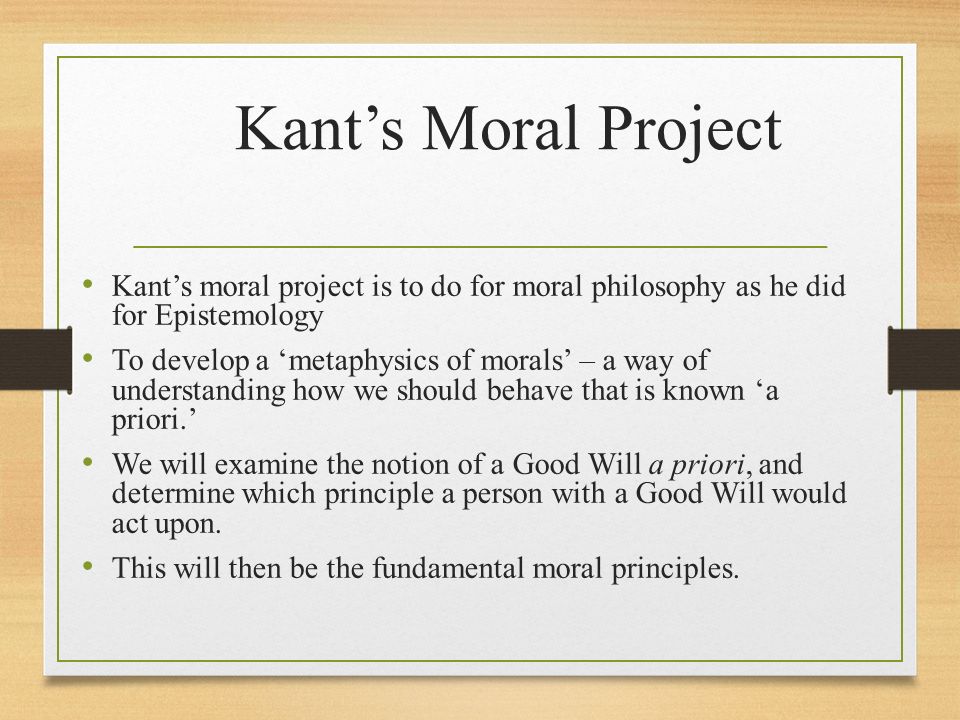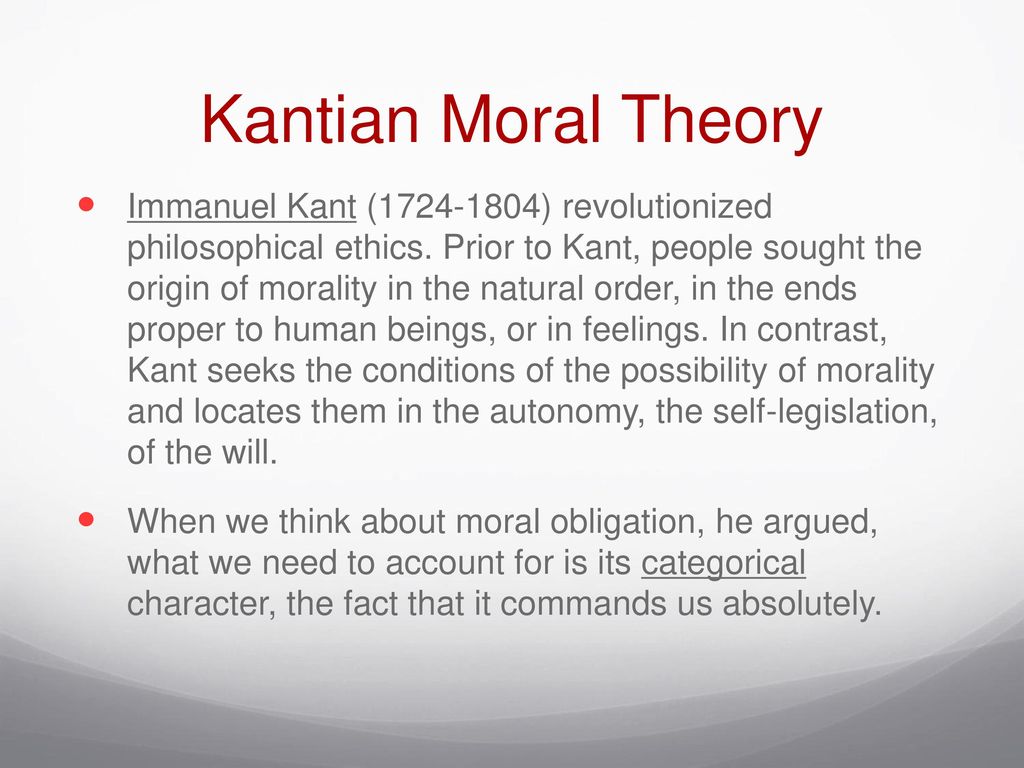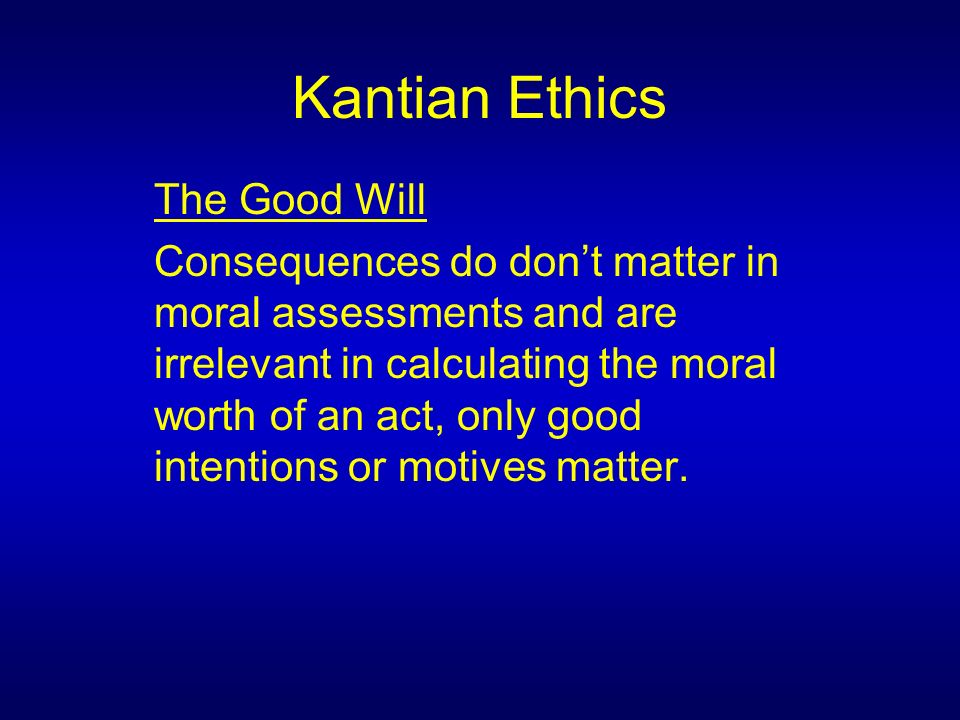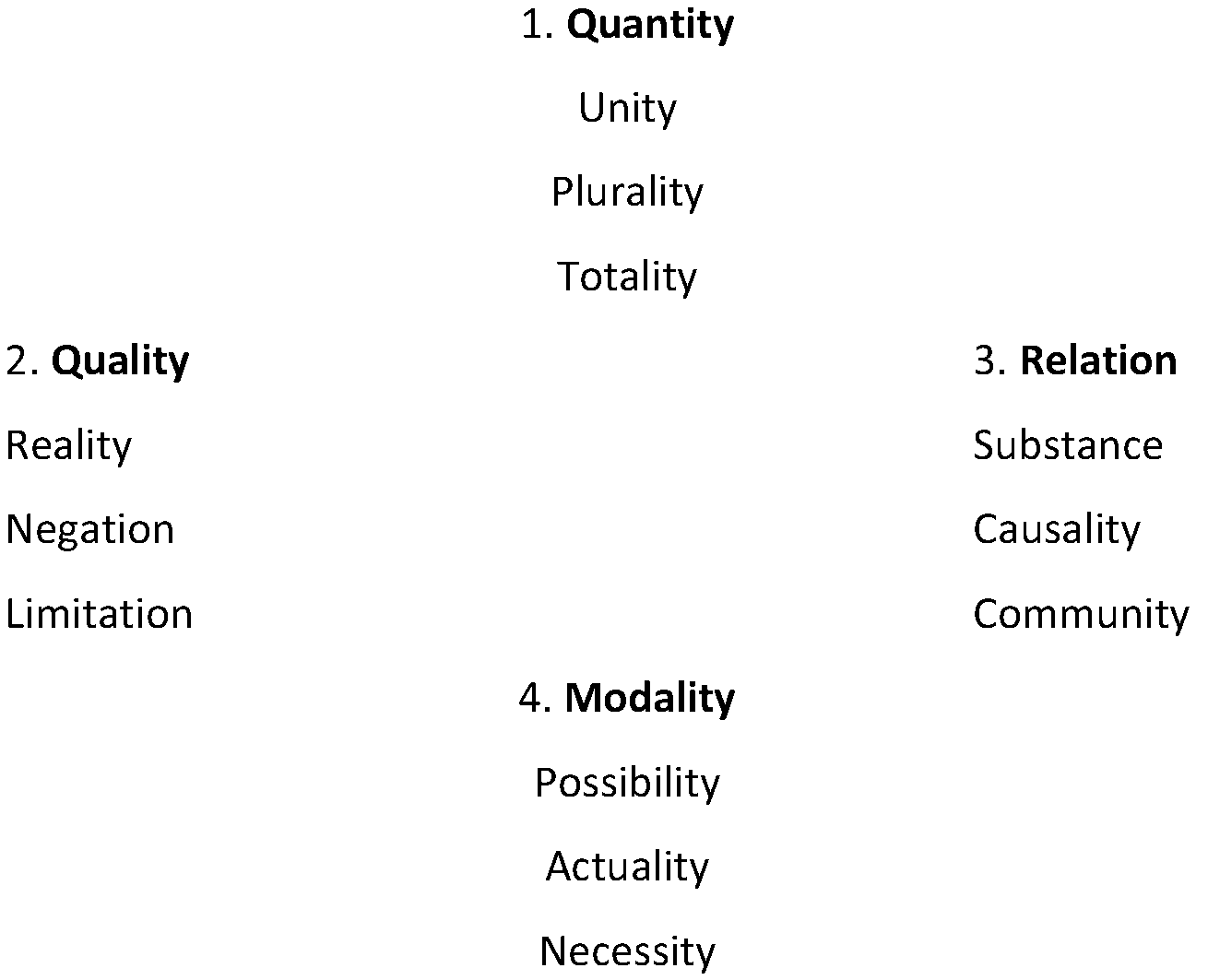Kant's Theory of Morality Is Best Described as
Applying Kants Theory Today. For Kant morality is not defined by the consequences of our actions our emotions or an external factor.

Kantian Moral Philosophy Ppt Video Online Download
Actions are morally right in virtue of their motives which must derive more from duty than from inclination.

. Depend on divine revelation. Kants theory of morality is best described as. Kant also believed that ou.
Kants moral theory is therefore deontological. From the Greek this is the science of duties. Kants Definition of Morality.
In Kants thought the representation of a principle as a binding commitment is called a command and the formula of the command is called an imperative. Kant wants us to believe that logical and mathematical concepts _____. A concept developed by the philosopher Immanuel Kant as an ethical guideline for behavior.
What counts as justice doesnt change says Holtman but how we realize justice will vary over time and in different. Kants view of Ethics I believe was that one should conduct ones life according to Maxims that would hold true morally not only for oneself but for every other rational human beings for all time irrespective of the effects of the Maxims - therefore Kants view was Non-consequentialist. Only reason is universal and to have moral maxim we must have moral reason.
Utilitarianism applies to anything anyone ever does because every action has consequences. Utilitarian Based on divine commands Relativistic Deontological Instructor Explanation. According to Kant moral laws apply.
A rule of thumb. To all rational beings in all places at all times. The clearest examples of morally right action are precisely those in which an individual agents determination to act in accordance with duty overcomes her evident self-interest and obvious desire to do otherwise.
Kant believed that the moral lawthe categorical imperative and everything it implieswas something that could only be discovered through reason. Persons conceived of as autonomous rational. A moral reason is one in which the maxim recommending the action is completely universalizable.
Kantianism only applies to intentional actions or actions that the agent actually considers. That person still has the power to benefit others in distress. Personal sorrow extinguishes all sympathy for others in a friend of mankind.
According to Kant actions conform to duty when. He says that the motive or means and not consequence or end of an action determines its moral value. The relationship between Immanuel Kant 17241804 and David Hume 17111776 is a source of longstanding fascination.
Kants theory of morality is best described as. It must not I do this is the formula of command. He lists moral feeling conscience love of human beings and respect for oneself as special kinds of feelings of which we are made aware only though consciousness of the moral law MM 6399.
For Kant morality was not a matter of subjective whim set forth in the name of god or religion or law based on the principles ordained by the earthly spokespeople of those gods. Kant credited Hume with waking him from his dogmatic slumber and he describes the Critique of Pure Reason arguably the most important work of modern philosophy as the solution to the Humean problem in its greatest possible amplification Prol. He tries to show objectivity to moral judgement and universal moral laws.
In deciding whether an action is right or wrong a person should evaluate the action in terms of what would happen if everybody else in the same situation or category acted the. Action has genuine moral. Kant saw this as the key to understanding and justifying the authority moral requirements have over us.
The answer can be found in Kants Groundwork for the Metaphysics of Morals Points Received. He uses reason to critique itself and identify the limits of rational understanding. Kantian Ethics is an absolutist theory therefore suppresses any chance of exception through circumstances or outcome but believes solely that the maxim of duty is the most important factor if not the only factor in making a moral decision.
The imperatives are expressed by the verb have to sollen. The imperative to the will says must when the will prefer to. The individual performs the action without any inclination at all but solely from duty.
A universal moral obligation that tells us what we ought to do no matter what under all conditions. If it is completely universalizable it is purely formal and reasonable and couldor indeed mustbe selected by any simply reasonable being such as God. A rule for maximizing happiness.
Kants view is that a moral action must be chosen for a moral reason. Like Utilitarianism ImannualKants moral theory is grounded in a theory ofintrinsic value. At the heart of Kants moral theory is the position that rational human wills are autonomous.
Depend on how our minds are shaped by experience. But where theutilitarian take happiness conceived of as pleasure and the absence of pain tobe what has intrinsic value Kant takes the only think to have moral worth forits own sake to be the good will. Kant describes these as moral endowments that lie at the basis of morality or the subjective conditions of receptivity to the concept of duty MM 6399.
Mill says that the motive doesnt have anything to do with the morality of an action but instead the worth of the agent. As with Rousseau whose views influenced Kant freedom does not consist in being bound by no law but by laws that are in some sense of ones own making. Kants moral theory is that he tries to make sure that we make moral judgements based on law and avoids the idea that we avoid emotions pleasure etc.
Kant believes the morality of an action CONSISTS IN the motive. Depend on the innate structure of our minds. Morality is defined by duties and ones action is moral if it is an act motivated by duty.
Thus Holtman sees Kants political philosophy not as an attempt to prescribe specific laws but rather as a general framework of principles for determining what counts as justice. According to Kant the only thing that is good in itself is the good will. Morally speaking Kant is a deontologist.
Utilitarian Based on divine commands Relativistic Deontological. Which of the following best characterizes Kants philosophical method. For Kant a moral action is not based upon feelings inclination or on the possibility of reward or positive outcome.
Kants moral philosophy is a deontological normative theory which is to say he rejects the utilitarian idea that the rightness of an action is a function of how fruitful its outcome is.

Kantian Ethics Introduction Ppt Video Online Download

Kant S Moral Theory Part 1 Of 2 Youtube

Kantian Moral Theory And The Liberal View Of Sexual Morality Ppt Download

No comments for "Kant's Theory of Morality Is Best Described as"
Post a Comment